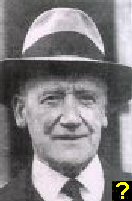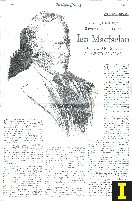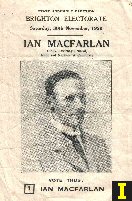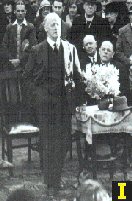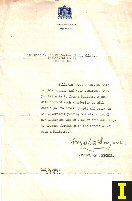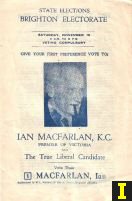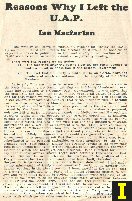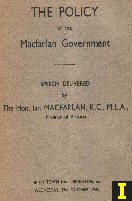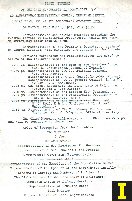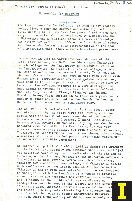Tabletalk, January 17, 1929, Page 13
Prominent Personalities
Written by P. B. JENKIN
Illustrated by L. F. REYNOLDS
Ian Macfarlan
VICTORIAN STATE
ATTORNEY-GENERAL
Cynics - the term does not appear in legal dictionaries - sometimes aver that both the law and politics are evils. Whether this be true or not, Mr Ian Macfarlan, the new Attorney-General of Victoria, has chosen both.
Mr Macfarlan is a legal luminary by training, but a politician by instinct. Otherwise, how could he have defeated nine opponents, one of whom was the doughty Mrs Glencross, now an overseer, and one supposes, an overhearer, of films In Sydney, at the Brighton by-election in April last year? History and the Electoral Officer for Victoria recall that he did so, handsomely.
Nor is he the first member to put Brighton's needs and wants before State Governments in the cool, precise, and almost brutally indirect phraseology of a barrister. Once upon a time, the salubrious seaside suburb was represented in the Legislative Halls by the present Judge Moule, and before his day the late Chief Justice Higinbotham used to catch Mr Speaker’s eye, so that Brighton’s thoughts might be broadcast through the State and later preserved in the yellowing pages of stored Hansards.
More recently, Brighton found its voice in Parliament through the late Mr O. R. Snowball, Mr Macfarlan’s immediate predecessor and up to the time of his death, Speaker of the Legislative Assembly. The law, possibly, would have liked to claim the weightiest of Brighton's representatives, the late Sir Thomas Bent, but “Tommy” suspected the “whereases” and the “now therefores” of legal diction from infancy, and Selborne Chambers always sent a shiver through his generous frame.
It is enough for the present, however, that two legal representatives of Brighton should eventually have been elevated to the Bench. History has a knack of repeating itself, mainly to oblige newspaper correspondents, but whether it will do so in the case of the present Attorney-General time alone can tell. And time is an oyster.
However, let it be said that the golden-haired, blue-eyed, clean-shaven, muscular-looking Ian Macfarlan fits the Attorney-General's easy chair like milady's dainty hand fits her silken gloves. He looks the part. He gazes across his table from behind a. rampart of Bills and documents, and talks quietly of what he hopes to do when order has been restored. Trained legal men have a way of creating order from chaos, which suggests that at heart they are all Mussolinis. Not that the Attorney-General outwardly resembles the Duce. But he gets there all the same, albeit less spectacularly.
Melbourne has always been his home. He first saw the light in 1882 at Carlton, which in those days made no visible motion at the knees when Toorak was mentioned. His people arrived in Australia in the fifties, so that the Attorney-General, by the payment of the usual fee, is entitled to move for the suspension of the standing orders at any A.N.A. conference.
His early education was gained at a State school. Strange how few of our great native Australians did not begin there! And he is proud to admit it. Blood – Scottish blood - will tell, however, and his parents had no alternative later on but to send him to Scotch. From there, naturally enough, he graduated to Ormond College, to which he won an entrance scholarship. Here he added to his talents with such effect that in his pursuit of the study of law, he won the judge’s prize valued at £185, and the largest cash prize among those open to folk at the University.
Leaving the "shop" with honors thick upon him, Mr Macfarlan became articled to the late Mr E. J. Guinness, who is best remembered as a brilliant Crown Solicitor. His turn came in 1908, when he was called to the Bar and in that year Selborne Chambers became his city home. For 20 years he has practised in Melbourne, and his voice in that period has been lifted only in the interests of his clients in the courts. Not until last year did he hear a call from somewhere in the region of the Bar of the House.
One expects a man of his stature, even a man immersed in Acts and amendments, to be "something" in the purely physical arena of life. One is not wrong. At the University, the Attorney-General rowed with three Ormond crews, and twice appeared in the crew in interstate University races. Subsequently he was a tower of strength to the Civil Service Club, with which he did his regatta racing.
When you know that, you know why the Attorney-General is not likely to be put out of his own office by someone who does not like the way he parts his hair.
He does not row now - it is not a game for a barrister-politician of 46 – but if you live at Sandringham you will (assuming that you also take a header into the waves every morning) see him on the beach with the second or third battalion of bathers about seven ack emma daily.
This, he says, keeps him fit nowadays, so fit that when he cleans up the arrears at his Governmental office he expects to be able to call at Selborne Chambers occasionally and interview a few clients – “make a little money” is his way of expressing it.
Mr Macfarlan is known in the city as a barrister with a profound knowledge of law. Because he possesses this knowledge he has no need to indulge in verbal acrobatics. He is not fiery, despite the tendency of his thatch to brand him as being a “Red.”
One cannot imagine him becoming flustered, or heated under the collar. That is not his way. He just gets there, and leaves the heroics to people who have nothing to say and say it with frills.
His rapid rise in Parliament, from the private benches to Ministerial office, is probably a record, but no one would suggest that the record should not be his. Above all, there is about him that judicial air with which his brother, Mr Justice Macfarlan, is more frequently surrounded.

